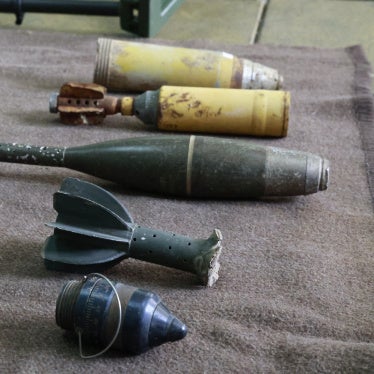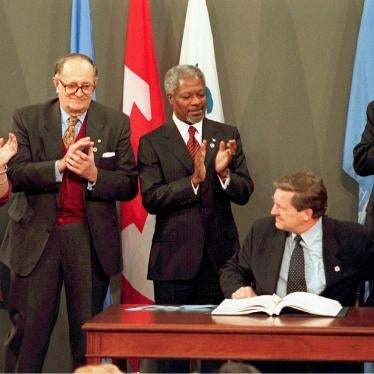Thank you Mr. Coordinator
The requirement to develop national implementation measures to give full effect to the Convention on Cluster Munitions is absolutely vital, but it has not been given the priority it deserves by many States Parties. So far only 22 States Parties – one quarter of the total – have passed national laws, which is insufficient. Another 19 states have said their current legislation is good enough, but in our view, new laws are always required to make sure they fully cover the specifics of the Convention and put in place adequate penal sanctions.
Fulfillment of Article 9 should not be seen as a difficulty, but rather an opportunity to ensure the Convention is fully respected. Without such measures, how can a state ensure that the Convention’s prohibitions can be fully enforced and any violators properly brought to justice? Implementation of all of the Convention’s positive obligations, including stockpile destruction, clearance, victim assistance, as well as reporting and the promotion of the ban norm, will also be aided by putting in place specific laws and regulations. Indeed, Article 9 requires measures to implement such positive convention obligations in addition to enforcing the ban.
The CMC believes that the effective implementation of Article 9 requires the passage of new legislation, in addition to any policies, directives, or other measures that might be created. While this can appear a cumbersome process in some states, there are many resources available to help. Two types of model legislation have been developed by the ICRC and New Zealand – the latter for states that are not affected by and don’t stockpile cluster munitions. We also welcome Ghana’s interest in working on an African model legislation and stand ready to provide whatever support we can to that initiative. The ICRC, civil society, UN agencies, and other States Parties are also ready to lend whatever assistance might be needed on developing a national law.
The Convention itself provides clear guidance on what should be in such laws as well. In order to enforce the Convention’s comprehensive ban, Article 9 requires at a minimum the full imposition of criminal sanctions to “prevent and suppress” any activity prohibited under Article 1, namely the use, production, acquisition, stockpiling or transferring of cluster munitions.
Most States Parties that have spoken on the matter agree that Article 1 also bans any direct and indirect assistance with any prohibited activity under any circumstances. This also needs to be included in national laws. Most States Parties that have spoken on the matter agree that the most common types of assistance that should be explicitly outlawed include: the transit of cluster munitions through or over national territory, the hosting of stockpiles owned by a state not party, and investment of both public and private funds in the development or manufacture of cluster munitions. In addition, if a law permits participation in joint military operations with a state not party, it should also make clear that there are no exceptions to the prohibition on assistance during such operations. And it should require active discouragement of the state not party from using cluster munitions. The CMC would be pleased to provide model language for each of these points.
While some states have included these types of provisions in their legislation, the CMC remains deeply concerned about those states whose laws are inconsistent with the spirit of letter of Article 1’s strong prohibitions. In addition to the law passed by Australia, we are particularly disturbed by the draft bill that has already been passed by the Canadian Senate and now sites before the House of Commons. The bill explicitly authorizes most forms of assistance in the use of cluster munitions, including, during joint military operations, “directing or authorizing an activity that may involve the use, acquisition, possession, import or export of a cluster munition.” How can a state claim to fully accept the ban on cluster munitions and yet allow its soldiers to help another state use them?
After extensive national and international criticism of the bill, there has been one small amendment to improve the text, but it still contains several provisions that run counter to the spirit and the letter of the Convention. It is unusual for national legislation to be so clearly contrary to the letter and spirit of a convention, and some might interpret it as a reservation. We strongly urge Canada to revise the text before passage. We would be pleased to work with Canada or any other state drafting national laws on text that fully supports the Convention and its goal of ensuring no further use of the weapon.
In closing, we ask States Parties and states working towards ratification or accession to give Article 9 the attention it deserves. We challenge all States Parties to put laws in place by the First Review Conference, a goal that can certainly be achieved and will go a long way to supporting full achievement of the Convention’s goals.
Thank you.








